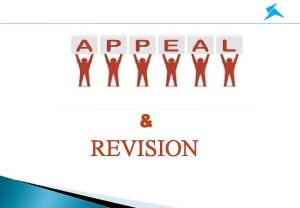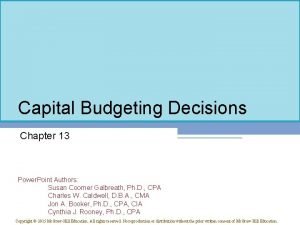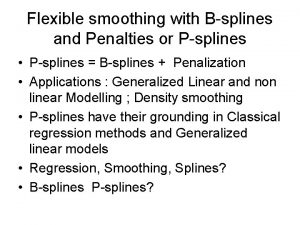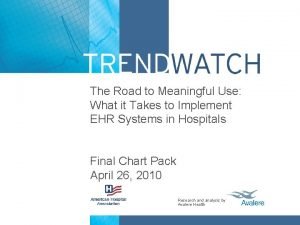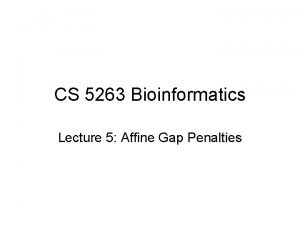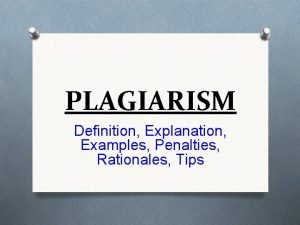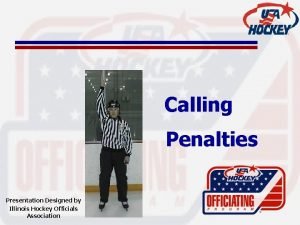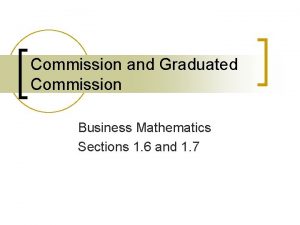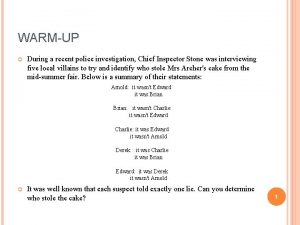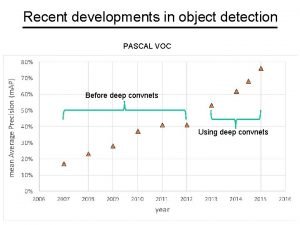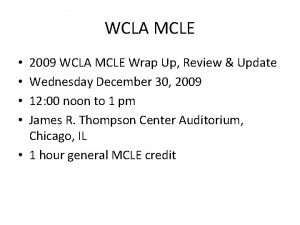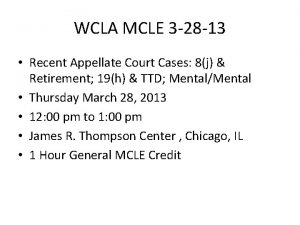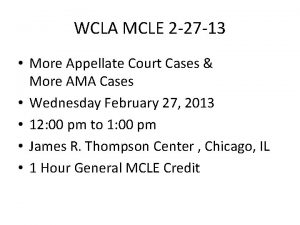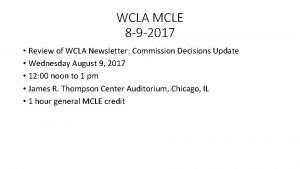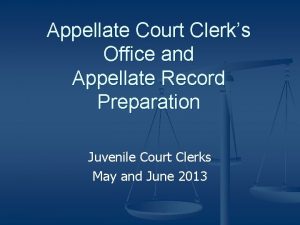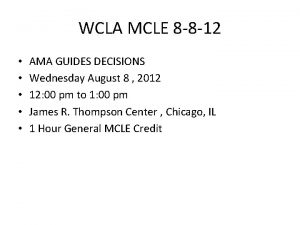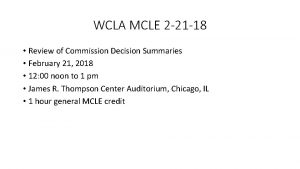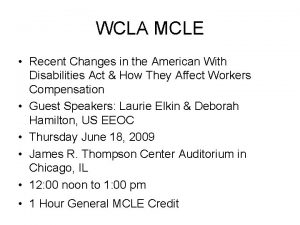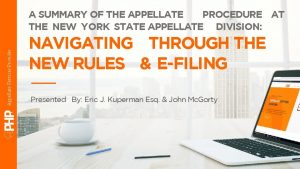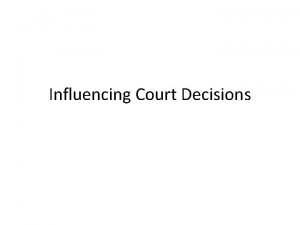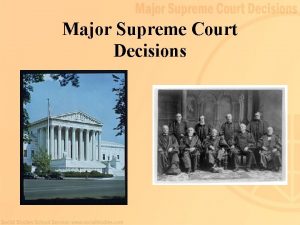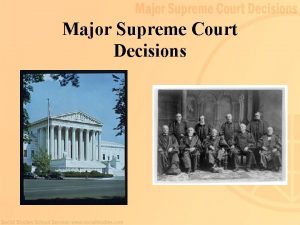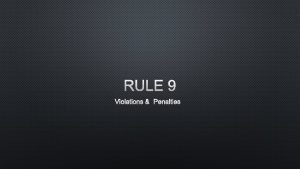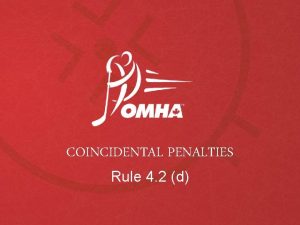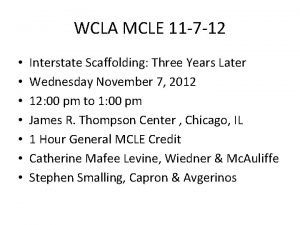WCLA MCLE Penalties Recent Appellate Court Commission Decisions




![Section 19(l) [Added to WODA as Section 19(k-1)] • “(l) If the employee has Section 19(l) [Added to WODA as Section 19(k-1)] • “(l) If the employee has](https://slidetodoc.com/presentation_image_h/b28cbb578848c4d11164c911ae89c77f/image-5.jpg)













- Slides: 18

WCLA MCLE • Penalties: Recent Appellate Court & Commission Decisions • Thursday October 22, 2009 • 12: 00 noon to 1: 00 pm • James R. Thompson Center Auditorium, Chicago, IL • 1 hour general MCLE credit

Statistics • The 225 cases in which penalties were awarded in FY 08 represent 4% of the decisions issued, and less than ½ of 1% of the cases closed. • PERCENTAGE OF DECISIONS AWARDING PENALTIES BY YEAR AWARDED • • ARBITRATION DECISIONS COMMISSION DECISIONS Expedited Regular FY 00 9% 2% 9% 2% FY 05 14% 3% 10% 4% FY 06 9% 3% 6% 4% FY 07 10% 2% 3% 2% FY 08 10% 2% 5% 2%

Applicability of 2005 Amendments • PA 94 -277: “Section 95. Applicability. The amendatory changes to the first paragraph of subsection (f) of Section 7 relating to payment for burial expenses, subsections (a) and (b) of Section 8, and subsections (h), (k), and (l) of Section 19 of the Workers' Compensation Act and subsections (k) and (k-1) of Section 19 of the Workers' Occupational Diseases Act apply to accidental injuries or diseases that occur on or after February 1, 2006. ” • Confusion? Bivona v. K-Mart, 08 IWCC 0685; Martinez v. Burgess Norton, 09 IWCC 0693

Section 19(k) • (k) In case where there has been any unreasonable or vexatious delay of payment or intentional underpayment of compensation, or proceedings have been instituted or carried on by the one liable to pay the compensation, which do not present a real controversy, but are merely frivolous or for delay, then the Commission may award compensation additional to that otherwise payable under this Act equal to 50% of the amount payable at the time of such award. Failure to pay compensation in accordance with the provisions of Section 8, paragraph (b) of this Act, shall be considered unreasonable delay. When determining whether this subsection (k) shall apply, the Commission shall consider whether an Arbitrator has determined that the claim is not compensable or whether the employer has made payments under Section 8(j). • Gwartney v. Karma Night Club, 09 IWCC 0548
![Section 19l Added to WODA as Section 19k1 l If the employee has Section 19(l) [Added to WODA as Section 19(k-1)] • “(l) If the employee has](https://slidetodoc.com/presentation_image_h/b28cbb578848c4d11164c911ae89c77f/image-5.jpg)
Section 19(l) [Added to WODA as Section 19(k-1)] • “(l) If the employee has made written demand for payment of benefits under Section 8(a) or Section 8(b), the employer shall have 14 days after receipt of the demand to set forth in writing the reason for the delay. In the case of demand for payment of medical benefits under Section 8(a), the time for the employer to respond shall not commence until the expiration of the allotted 60 days specified under Section 8. 2(d). In case the employer or his or her insurance carrier shall without good and just cause fail, neglect, refuse, or unreasonably delay the payment of benefits under Section 8(a) or Section 8(b), the Arbitrator or the Commission shall allow to the employee additional compensation in the sum of $30 per day for each day that the benefits under Section 8(a) or Section 8(b) have been so withheld or refused, not to exceed $10, 000. A delay in payment of 14 days or more shall create a rebuttable presumption of unreasonable delay. “

Rule 7110. 70 • • • Section 7110. 70 Explanation of Basis of Non-Payment, Termination or Suspension of Temporary Total Compensation or Denial of Liability or Further Responsibility for Medical Care a) When an employee becomes unable to work due to an accidental or occupational disease arising out of or in the course of his or her employment, or alleges that he or she is unable to work, the employer, individually or by his or her agent, service company or insurance carrier, shall, within 14 calendar days after notification or knowledge of such inability or alleged inability to work: 1) begin payment of temporary total compensation, if any is then due; or 2) if the employer denies liability for payment of temporary total compensation for whatever reason, provide the employee with a written explanation of the basis for the denial; or 3) if the employer has insufficient information to determine its liability for payment of temporary total compensation, advise the employee in writing of the information needed to make that determination and provide in a written explanation why the requested information is necessary. b) When an employer begins payment of temporary total compensation and later terminates or suspends further payment before an employee in fact has returned to work, the employer shall provide the employee with a written explanation of the basis for the termination or suspension of further payment no later than the date of the last payment of temporary total compensation. c) When an employer takes the position that it has insufficient medical information to determine its liability for the initial payment of temporary total compensation, or the continuation of such payment, the employer shall have the initial responsibility to promptly seek the desired information from those providers of medical, hospital and surgical services of which the employer has knowledge. The employee shall have the responsibility to provide or execute authorizations for release of medical information as the employer may reasonably request from time to time, and the employer shall promptly provide the employee or his or her representative, upon request, with copies of the complete medical records and reports it obtains with the authorizations. d) When an employer denies liability for payment of the cost of all or a part of an employee's medical care, or initially accepts liability but subsequently declines further responsibility for providing or paying for all or a part of such care (for any reason including but not limited to the necessity or propriety of the care, or continuing care, or the unreasonableness of the cost of care), the employer shall promptly notify the employee with a written explanation of the basis for the denial of liability or further responsibility. e) Failure by either party to comply with the provisions of subsection (a), (b), (c) or (d) of this Section without good and just cause, shall be considered by the Commission or an Arbitrator when adjudicating a petition for additional compensation pursuant to Section 19(l) of the Act, or a petition for assessment of attorneys' fees and costs pursuant to Section 16 of the Act.

Enforcement of Rule 7110. 70 • • Bustami v. H & H Electric, 09 IWCC 0194: “The Arbitrator has already found that the opinions of Dr. K. Singh are not credible given the substantial medical evidence to the contrary. Respondent further failed to provide any written explanation for its non-payment of benefits, contrary to 7110. 70 of the Rules Governing Practice before the Commission. The section 19(l) penalty is in the nature of a late fee. Assessment of the penalty is mandatory ‘if the (benefit) payment is late, for whatever reason, and the employer or its carrier cannot show an adequate justification for the delay. ’ Mc. Mahan v. Industrial Commission, 183 Ill. 2 d 499 at 515 (1998). In light of the above, no adequate justification was provided by Respondent herein. The Petitioner therefore asks for additional compensation pursuant to Section 19(l) in the amount of $ 3, 120. 00 (104 days @ $ 30/day per the authority of Rokosz v. Simplex Grinnell/LP Tyco, 06 IWCC 1093)” Connell v. IIC, 170 Ill. App. 3 d 49 (1988): Even when the Respondent has a reasonable basis for cutting off benefits, failure to comply with rule can support an award of 19(l) penalties

Burrell v. City of Madison 09 IWCC 0789; 07 WC 056092 • • “The Commission reduces the penalties imposed on Respondent under section 19(l) of the Act to $ 30 per day from January 29, 2008 through March 20, 2008. The pertinent question applicable to all of the Act's penalty provisions is whether the employer acted reasonably in failing to pay benefits. See Avon Products, Inc. v. Industrial Commission, 82 Ill. 2 d 297, 301 (1980) (‘Although the statutory language is not uniform [between Sections 16, 19(l), and 19(k)], it is apparent that its intent is to implement the Act's purpose to penalize an employer who unreasonably, or in bad faith, delays or withholds compensation due an employee’); accord USF Holland, Inc. v. Industrial Commission, 357 Ill. App. 3 d 798, 804 (2005). If an employer has a reasonable basis on which to contest liability, including the presence of reasonable, conflicting medical opinions in the case, sanctions generally will not lie. See Avon Products, 82 Ill. 2 d at 302; USF Holland, 357 Ill. App. 3 d at 805. In this case, we find Respondent could have reasonably disputed liability until Dr. Katz's section 12 examination; after that point, however, Respondent unreasonably withheld compensation. ” 52 days X 30/day = $1560 Arbitrator awarded 19(l) in the amount of $4410 or 147 days X $30/day from the date Petitioner was taken off work to the date of 19(b) hearing or the period of TTD awarded 21 weeks

Messerly v. Thomas Industrial 09 IWCC 0769; 05 WC 010045 • Arbitrator Tobin: “Petitioner is hereby awarded penalties under Section 16, Section 19(k), and Section 19(l) of the Act. Respondent's actions in failing to follow the prior order and award as well as cutting off maintenance benefits rise to the level of being unreasonable, vexatious and not in good faith. Under Section 19(l), the Respondent has failed to approve and pay for previously ordered vocational benefits as well as maintenance benefits and that failure to pay is without good and just cause. Vocational benefits with Trares were not approved nor paid for at any time after the 9/12/06 hearing to the closing of proofs for the second 19(b) hearing on 1/11/08, a period of 69 and 3/7 ths weeks. (486 days) The date of accident is before 2/01/06 therefore the appropriate multiplier is $ 10 per day, rather than $ 30, for a total of $ 4, 860. 00 for 19(l) penalties. Under Section 19(k), Petitioner is awarded penalties of 50% of the amount payable for Respondent's unreasonable and vexatious delay in paying for vocational benefits and maintenance benefits. Maintenance benefits were cut off on 9/19/07. The period from 9/20/07 through 1/11/08 constitutes 16 and 1/7 ths weeks at $ 924. 42 for a total of unpaid maintenance of $ 14, 922. 78. The unpaid vocational rehabilitation bill of Trares which was actually awarded totaled $ 18, 686. 64. At the [*44] time of the award these two items were payable and 50% of that total is $ 16, 804. 71, and that is awarded as the 19(k) penalty. Under Section 16, Respondent has intentionally, vexatiously, unfairly and in bad faith delayed payment of Petitioners benefits such that the Arbitrator awards the entire attorneys' fee of $ 11, 054. 83 (20% of this total award) to Petitioner. ($ 4, 860+$ 14, 922. 78+$ 18, 686. 64+116, 804. 71=$ 55, 274. 13 X. 20=$ 11, 054. 83. ) • Commission: The Arbitrator's Decision is further modified to reflect that Petitioner is not entitled to penalties and fees under Sections 19(k), 19(l), or 16. The Commission finds the Respondents' reliance upon the opinions of Daniel Minnich, Respondent's vocational counselor, and the videotape surveillance, in terminating maintenance benefits after September 2007, did not rise to the level of being unreasonable, vexatious, or in bad faith. Minnich testified that employment similar to Petitioner's prior job, as a project manager, still existed in the open market, and that Petitioner was still employable and placeable. More importantly, the videotape surveillance tendered into evidence clearly shows Petitioner golfing, on several occasions, in summer weather, in warmer temperatures than that which Dr. Volarich indicates Petitioner is able to tolerate without possible heat exhaustion. The Commission finds that both parties have engaged in conduct that has not been entirely in good faith, including Petitioner's apparent exaggeration of his symptoms to Dr. Volarich, and Respondent's attempt to interfere with Petitioner's rights under the Illinois Workers' Compensation Act, as evidenced by the May 12, 2005 email from Respondent to its third-party administrator.

Nobile v. Midwest Wrecking 09 IWCC 0751; 07 WC 015248 • • Arbitrator Carlson : “Petitioner seeks penalties for delay in payment of benefits for 100% loss of use of petitioner's left middle finger due to traumatic amputation. The following is undisputed. On November 2, 2006 petitioner sustained a crush injury to his left middle finger resulting in an amputation at the third phalanx of that finger. As of the date of injury, petitioner was temporarily totally disabled. On November 20, 2006 respondent began to issue TTD benefits. On April 4, 2007, petitioner filed an Application for Adjustment of Claim alleging amputation of the left middle finger in addition to other injuries to the left hand. On November 27, 2007 petitioner filed a Petition for Penalties under Sections 19(k), 19(l) and 16 of the Act. Respondent issued various drafts for payment of the statutory 100% loss of petitioner's left middle finger as follows: a. July 7, 2008 $ 10, 849. 48 b. April 11, 2008 $ 8, 059. 61 c. April 21, 2008 $ 619. 97 d. April 28, 2008 $ 619. 97 e. May 5, 2008 $ 619. 97 f. May 12, 2008 $ 619. 97 g. May 14, 2008 $ 1, 239. 94 h. May 14, 2008 $ 929. 95 TOTAL $ 23, 588. 86 The only issue remaining is whether these payments were made timely, and whether penalties apply. This issue has been recently been decided by this Commission in the matter of Kinnard v. Green Welding & Hardware, 08 I. W. C. C. 0812 (July 3, 2008). In Kinnard the petitioner sustained a traumatic amputation of part of the right ring finger and part of the right middle finger on December 9, 2005. The operative report of the same date documented the amputations. Petitioner returned to work on or about January 16, 2006. Respondent tendered its first check for statutory amputation benefits on February 27, 2006 alleging that no such benefits were due until petitioner reached MMI. The Commission, citing the Appellate Court in the matter of Lester v. Industrial Commission, 253 Ill. App. 3 d 520, 623 N. E. 2 d 191 (1993), held that it was the intent of the legislature that an employee who suffers amputation should be compensated immediately when no dispute exists as to the compensability of the accident. The respondent asserts that there remains a dispute as to whether petitioner suffered 50% or 100% amputation of his finger. However, the Arbitrator notes that this issue was first raised at the end of trial when respondent filed its Response to Petition for Penalties. Further, respondent had already made payment upon 100% loss of petitioner's left middle finger, albeit late. The medical records as of November 2, 2006 clearly show that petitioner sustained an amputation of his left middle finger past the first knuckle. The Arbitrator finds the delay in payments to be unreasonable and vexatious. The Arbitrator finds that the fact of petitioner's 100% amputation of his left middle finger became evident on November 2, 2006. 100% loss of a middle finger is 38 weeks, which would have accrued in full by July 26, 2007. Final payment upon the statutory loss was not issued until May 14, 2008. Petitioner is awarded penalties pursuant to Section 19(k) of the Act in the amount of 50% of the accrued statutory amount $ 11, 779. 43 ($ 23, 558. 86 x 50%). ” Commission affirms

Amount of 19(k) Penalty • • • On what is 50% based? Unpaid at time of award or total amount due despite payment? Valenzuela v. MLR, 04 IIC 0085: “Respondent's argument is without merit. As early as December 2, 1997 Respondent prepared its own wage document and had it in its possession for well over 4 years before deciding to make Petitioner financially whole. The Commission finds Respondent's conduct in its failure to make timely TTD payments reprehensible and as such should be subjected to penalties on the entire 242 weeks of TTD, or $ 59, 611. 86 under section 19(k) and $ 23, 844. 74 under section 16 of the Act. See Roodhouse Elevator Company v IIC, 276 Ill. App. 3 d 576 (1995). The Commission also notes Petitioner had no obligation to raise the TTD issue. ” See also, Moore v. IIC, 188 Ill. App. 3 d 31 (1989); Navistar v. IIC, 331 Ill. App. 3 d 405 (2002): “Rather, we believe that Moore stands for the proposition that the Commission may award penalties and fees on the whole amount, rather than just the unpaid portion. The Commission is not required to do so, however, and it may, in its discretion, base the penalty and fee awards on that portion of the award which has accrued but has not been paid…Nothing precludes the Commission from awarding penalties and fees notwithstanding the fact that the employer has paid all amounts due and owing as of the time of the penalty hearing. ”

Bruder v. Porter Services 08 IWCC 1450; 04 WC 012143 • Penalties on Prospective Medical: “Lastly, we consider the issue of penalties and attorney fees. We agree with the Arbitrator's award of penalties and attorney fees for nonpayment of temporary total disability benefits. In addition, we find that penalties and attorney fees are warranted for failure to comply with the Arbitrator's order of prospective medical care, with the dollar amount to be held in abeyance and decided once the costs of prospective medical care known. See Bridges v. Rosewood Care Centers, 06 IWCC 0430. ”

Grady v. Rentals by MSB 09 IWCC 0462; 06 WC 027883 • • “The Arbitrator notes that medical bills incurred after February 1, 2006 are to be paid pursuant to the medical fee schedule contained in the recent amendment to the Illinois Workers Compensation Act. This may cause the total amount awarded to decrease to comply with the provisions of said schedule. ” Petitioner is entitled to penalties pursuant to Section 19(k) and 19(l) of the Act due to the fact that Respondent's vexatious and unreasonable refusal to acknowledge its employee-employer relationship with Petitioner and pay for the reasonable and necessary medical care and treatment Petitioner required as a result of his accident. Respondent's actions in this regard are even more vexatious and unreasonable when its actions after receiving notice of Petitioner's Application for Adjustment of Claim are taken into consideration. Specifically, immediately after received notice of Petitioner's Claim, Respondent terminated Petitioner's employment and began eviction proceedings to have him and his family removed from the apartment in which they lived in for the previous two years. The Arbitrator is of the opinion that Respondent's actions where vexatious and unreasonable, entitling Petitioner to an award of penalties under Section 19(k) in an amount equal to $5, 345. 15, which represents 50% of the amount payable as stated herein for Petitioner's medical expenses and temporary total disability; penalties under Section 19(l) in an amount equal to $9, 300. 00 (310 days x $ 30. 00); and attorneys' fees under Section 16 in an amount equal to $2, 138. 06, which represents 20% of the amount payable as stated herein for Petitioner's medical expenses and temporary total disability. The Arbitrator notes that since medical bills incurred after February 1, 2006 are to be paid pursuant to the medical fee schedule contained in the recent amendment to the Illinois Workers Compensation Act. This may cause the total amount awarded under Sections 19(k) and 16 to decrease to comply with the provisions of said schedule.

Residential Carpentry v. IWCC 389 Ill. App. 3 d 975; 910 N. E. 2 d 109; 331 Ill. Dec. 36 (2009) • 07 IWCC 1061 affirming: “Considering the totality of the circumstances and the law applicable thereto, the Arbitrator finds that the following awards of penalties are appropriate: First of all in reference to the non-payment of temporary total disability benefits, the Arbitrator finds that pursuant to Section 19(1) of the Act, the petitioner should be awarded $ 1, 960. 00 (28 x 7 x 10 = 1, 960) for the failure to pay temporary total disability benefits pursuant to Section 19(l). The Arbitrator additionally finds that in reference to Section 19(k), the following penalties should and are hereby awarded: Fifty percent of the unpaid temporary total disability benefits (. 50 x 20, 741. 28) plus fifty percent of the unpaid medical (. 50 x 5, 736. 83) for a total of $ 13, 239. 05. The Arbitrator has also considered making an award of penalties based upon the estimated costs of prospective surgery, which refusal to authorize the Arbitrator finds to have been unreasonable and vexatious in not being provided. Conservative estimates of costs in reference to the surgical procedures in reference to the doctor and the hospital would be $ 5, 200 and $ 8, 000. There would additionally be therapy thereafter. That would total $ $13, 200. The Arbitrator has considered making an award of 50% of the estimated surgical costs. However, given the authority of Mc. Mahan v. Industrial Commission, 183 Ill. 2 d 499, 702 N. E. 2 d 545 (1998), Zitzka v. Industrial Commission, 328 Ill. App. 3 d 844, 767 N-E. 2 d 405 (2002), Morgan v. Vermont Foundry Company, 03 -IIC-494 and Tanner v. Dave Clinard Trucking, 03 -IIC-813, the Arbitrator believes it more appropriate and does hereby order that penalties should be awarded in reference to the vexatious and unreasonable failure to authorize surgery, but that the calculation of the amount of the penalties pursuant to Section 19(1) and also later herein in reference to Section 16, should be done following the receipt of the actual bill for surgery from both the hospital and the doctor and should be at that time calculated and order to be paid in the amount of 50% of those bills. (See Tanner v. Dave Clinard Trucking 03 -IIC-813 and Morgan v. Vermont Foundry Company, 03 -IIC-494. ) Similarly, in reference to Section 16, the Arbitrator finds the petitioner should be entitled to attorneys fees for the unreasonable refusal to pay the medical expenses incurred to date, the unreasonable refusal to authorize the petitioner's surgery and the unreasonable refusal to pay temporary total disability benefits. At present, the Arbitrator calculates the amount in reference to the Section 16 penalties due in reference to temporary total disability benefits and medical incurred to date to be in the amount of $ 5, 295. 62. (. 2 x 26478. 11) The arbitrator additionally finds that the petitioner should be entitled to penalties in reference to the unreasonable refusal to pay prospective surgery, but further finds and orders that the amount of those penalties be calculated when the actual costs in reference to the surgery are known and the respondent is ordered to pay additional penalties when those costs are known of 50% of the physician's charge and 50% of the hospital charge in reference to surgery on the petitioner's right shoulder. ”

Residential Carpentry v. IWCC 389 Ill. App. 3 d 975; 910 N. E. 2 d 109; 331 Ill. Dec. 36 (2009) • • Appellate Court: “The standards under section 16 and section 19(k) are similar. Both require an unreasonable or vexatious delay in payment. Vulcan Materials Co. v. Industrial Comm'n, 362 Ill. App. 3 d 1147, 1150, 842 N. E. 2 d 204, 299 Ill. Dec. 465 (2005). Typically, "an employer's reasonable and good faith challenge to liability ordinarily will not subject it to penalties under the Act. " Matlock v. Industrial Comm'n, 321 Ill. App. 3 d 167, 173, 746 N. E. 2 d 751, 253 Ill. Dec. 930 (2001). Where an employer is in possession of facts that would justify a denial of benefits, penalties and fees are generally inappropriate. Electro-Motive Division v. Industrial Comm'n, 250 Ill. App. 3 d 432, 436, 621 N. E. 2 d 145, 190 Ill. Dec. 276 (1993). Good faith must be assessed objectively, thus the question is whether an employer's denial of benefits was reasonable. Electro-Motive Division, [*984] 250 Ill. App. 3 d at 436. The employer bears the burden of demonstrating that its denial of benefits was reasonable. Electro-Motive Division, 250 Ill. App. 3 d at 436. With these standards in mind, we turn to respondent's argument. ” “In essence, it was not reasonable for respondent to attempt to subdivide a region of claimant's body in a manner contrary to how it would be treated in the normal course of medical practice. Given the state of the record, most notably Rezin's testimony that the conditions were related, we cannot say that the Commission's decisions to award claimant fees and penalties were against the manifest weight of the evidence”

Global Products v. IWCC 329 Ill. App 3 d 408; 911 N. E. 2 d 1042; 331 Ill. Dec. 812 (2009) • 35 year old wheel buff carrier • DA 8 -31 -99, slip and fall • Two surgeries: 1) Dr. Chavez discectomy 1999 & 2) Dr. Marc Levin fusion 2002 • IME Dr. Steven Mather (2003): non-union due to cigarette smoking • Respondent asserts injurious practice and intervening cause

Global Products v. IWCC 329 Ill. App 3 d 408; 911 N. E. 2 d 1042; 331 Ill. Dec. 812 (2009) • 07 IWCC 0583 Commission affirms: “Petitioner is entitled to penalties pursuant to Section 19(1), 19(k) and 16 of the Act because Respondent's failure to pay temporary disability and medical benefits was unreasonable and vexatious. Petitioner is entitled to $ 69, 850. 34 in temporary disability 327 3/7 times $ 213. 33. Respondent has failed to pay and has unreasonably withheld 95 weeks of compensation or 665 days of unpaid TTD. Petitioner is entitled to $ 2, 500. 00 pursuant to section 19(1). Petitioner further is entitled to $ 36, 676. 90 pursuant to Section 19(k) ($ 20, 175. 88 unpaid TTD x. 5 = $ 10, 087. 94) + ($ 53, 177. 91 unpaid medical x. 5 = $ 26, 588. 96) = $ 36, 676. 90. Petitioner is entitled to $ 14, 670. 76 pursuant to Section 16 ($ 20, 175. 88 x. 2 = $ 4, 035. 18) + $ 53, 177. 91 x. 2 = $ 10, 635. 58) = $ 14, 670. 76. Respondent has refused to pay Petitioner due to an erroneous belief that Petitioner need for surgery is based on an unreasonable demand. All doctors agree that the surgery is reasonable and necessary. Dr. Levin has testified that' he would not withhold fusion surgery just because someone smoked cigarettes. Dr. Mather feels that the surgery is not unreasonable if Petitioner is advised the effects smoking could have on his recovery. The Arbitrator finds that Respondent was vexatious in its refusal to pay compensation and the medical bills incurred by the Petitioner. ”

Global Products v. IWCC 329 Ill. App 3 d 408; 911 N. E. 2 d 1042; 331 Ill. Dec. 812 (2009) • Appellate Court: “Respondent also argues that the Commission erred when it imposed penalties ( 820 ILCS 305/19(k), 19(l) (West 1998)) and awarded attorney fees ( 820 ILCS 305/16 (West 1998)). Whether to award penalties and fees presents a factual question. Greaney v. Industrial Comm'n, 358 Ill. App. 3 d 1002 (2005). We will not disturb the decision of the Commission on these matters unless it is contrary to the manifest weight of the evidence. Mc. Kay Plating Co. v. Industrial Comm'n, 91 Ill. 2 d 198(1982). Penalties and fees under sections 16 and 19(k) are appropriate where an employer's decision to delay payment of benefits is unreasonable or vexatious. Mc. Mahan v. Industrial Comm'n, 183 Ill. 2 d 499 (1998). Generally, "[w]hen the employer acts in reliance upon reasonable medical opinion or when there are conflicting medical opinions, penalties ordinarily are not imposed. " USF Holland, Inc. v. Industrial Comm'n, 357 Ill. App. 3 d 798 (2005). The relevant question is "whether the employer's reliance was objectively reasonable under the circumstances. " Electro-Motive Division v. Industrial Comm'n, 250 Ill. App. 3 d 432 (1993). Section 19(l), which is more in the nature of a late fee, allows an award upon a lesser showing, applying when an employer "neglects, or refuses to make payment or unreasonably delays payment 'without good and just cause. '" Mc. Mahan, 183 Ill. 2 d at 515, quoting 820 ILCS 305/19(l) (West 1992). The employer bears the "burden of showing that it had a reasonable belief that the delay was justified. " Roodhouse Envelope Co. v. Industrial Comm'n, 276 Ill. App. 3 d 576 (1995). Respondent asserts that its denial of benefits was reasonable because it had set forth a meritorious defense "based on the medical opinion of Dr. Mather and existing case law. " As we explain above, the "existing case law" upon which respondent relies--namely, Gallego, 168 Ill. App. 3 d 259, 522 N. E. 2 d 692, 119 Ill. Dec. 30 , and Beebe, No. 99 WC 66951 --is clearly distinguishable. However, Mather's testimony was relatively compelling, even if it did not ultimately persuade the Commission. Accordingly, we hold that respondent could rely upon Mather, and that no reasonable person could conclude that respondent was not entitled to do so. Since an abuse of discretion occurs when no reasonable person could agree with the position taken by the Commission ( Certified Testing, 367 Ill. App. 3 d at 947), we are compelled to conclude that the Commission abused its discretion in imposing fees and costs. We reverse its decision in this respect. ”
 Decisions decisions decisions poster
Decisions decisions decisions poster Competition appellate tribunal
Competition appellate tribunal Quasi-judicial proceeding
Quasi-judicial proceeding Screening decisions and preference decisions
Screening decisions and preference decisions Is there a basketball court above the supreme court
Is there a basketball court above the supreme court Flexible smoothing with b-splines and penalties
Flexible smoothing with b-splines and penalties Meaningful use chart
Meaningful use chart Penalties for violating fwa laws
Penalties for violating fwa laws Affine gap
Affine gap Plagiarism definition and examples
Plagiarism definition and examples Hockey penalties signals
Hockey penalties signals Defects of existing curriculum
Defects of existing curriculum Graduated commission definition
Graduated commission definition Emerging trends in mis
Emerging trends in mis Biotaphonomy
Biotaphonomy Recent developments in object detection
Recent developments in object detection Recent developments in ict
Recent developments in ict News that have passive voice
News that have passive voice Trends in project portfolio management
Trends in project portfolio management


